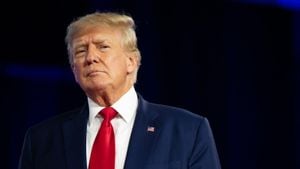President-elect Donald Trump's recent pick for Defense Secretary, Pete Hegseth, is facing serious allegations stemming from his past. According to Hegseth's lawyer, Timothy Parlatore, he settled with a woman who accused him of sexual assault to prevent the threat of what he deemed to be baseless lawsuits. This incident reportedly dates back to 2017 and involved claims made after Hegseth attended the California Federation of Republican Women convention.
The allegations recently resurfaced following the delivery of a memo to Trump's transition team from a friend of the accuser, highlighting the case's details. Parlatore stated this settlement was made out of concern for how the accusations would affect Hegseth's career at Fox News, where he had gained considerable popularity as a host.
On the night of the incident, at the hotel where the convention was held, the woman who later accused Hegseth described her experience to authorities after she became entangled with him during what Hegseth's lawyer claimed was a consensual encounter. Parlatore reports Hegseth had become visibly intoxicated during the event's festivities.
While the accusations have prompted investigations by local law enforcement, no charges were ever filed against Hegseth, and he passionately denies the allegations. According to Parlatore, the encounter was initiated by the woman, and her actions fell under what he termed “successful extortion.” He characterized Hegseth as the victim of blackmail.
The memo sent to the transition team elaborated on the circumstances surrounding the night of the alleged assault, indicating the woman later visited the emergency room, where exam results reportedly confirmed traces of sexual contact, adding a layer of complexity to the case.
Despite the scrutiny and potential ramifications of these revelations, Trump's transition team publicly reaffirmed their confidence in Hegseth. Steven Cheung, the chief communications director for Trump, issued statements asserting Hegseth's innocence, reiteration of his record and qualifications, and expressed eagerness for his confirmation as the Secretary of Defense.
Further complicative elements emerged from Hegseth's past, particularly his controversial tattoo reading “Deus Vult,” Latin for “God wills it.” This phrase has historical ties to the Crusades and has been absorbed by certain extremist groups to symbolize nationalist agendas. The tattoo has raised eyebrows among those concerned about Hegseth's views and alignment during his potential military governance.
Critics have pointed to Hegseth's connections to various right-wing movements, along with the current political climate, which has amplified allegations of misconduct against many public figures. Democratic leaders raised their voices, suspecting these past allegations might serve to hinder or derail Hegseth's nomination especially as the Senate prepares for the confirmation process.
Adding to the conversation, fears of how the allegations might affect the nation’s military leadership have ignited discussions within political circles. Some senators are proceeding with caution, indicating they plan to methodically evaluate Hegseth's nomination before it goes to the Senate floor for deliberation.
The nomination and its reception reflect broader sections of societal discourse on accountability and transparency within the highest levels of government. Observers remain skeptical, citing how previous administrations have dealt with allegations of impropriety involving nominees.
Despite the potential political fallout, Hegseth vehemently maintains his innocence, framing the allegations and the ensuing scrutiny as politically motivated afterthoughts. His political allies continue to bolster his position, framing the narrative around competency and experience versus the unfavorable discussions of his past encounters.
With mounting scrutiny over the confirmation process and the palpable tension surrounding the accusations, it remains to be seen how the Senate will navigate this delicate situation. Hegseth’s capability to assume the prestigious role faces increasing opposition.
The confirmation vote is anticipated to be closely watched, as not only does Hegseth’s future hang in the balance, but the outcome may well serve as commentary on the current administration's handling of past allegations and moral conduct within its ranks. Hegseth's story is one reflective of wider societal challenges as discussions around accountability and leadership evolve.



